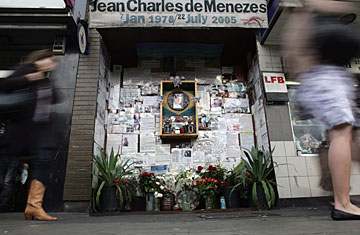
Morning commuters pass photographs and messages on a shrine to deceased Jean Charles de Menezes outside Stockwell Underground Station in London.
A much-awaited public inquiry into the shooting death of an innocent man mistaken for a suicide bomber opened in London this morning amid high security, protests and calls for the police commissioner to resign.
Two London anti-terror specialists shot Jean Charles de Menezes, 27, seven times in the head at close range after he boarded a London subway train on the morning of July 22, 2005. De Menezes, a Brazilian electrician, lived in an apartment block adjacent to a would-be terrorist who, the day before, had botched an effort to blow himself up on the London Tube. On July 22, as police continued their surveillance of the suspect's housing block, de Menezes left his apartment for work and unknowingly stepped into the middle of the manhunt. Thirty-four minutes later he was dead.
"It must be stated at the outset of this inquest with the greatest possible emphasis that in truth Mr. de Menezes was in no way associated with bombs, explosions or any form of terrorism," judge Michael Wright told the jury at the start of the hearing. British law requires an inquest when a person dies unexpectedly, violently or of unknown causes. The goal is not to determine criminal responsibility, but to establish the facts of the case. At the end of the inquest, the jury can issue a narrative verdict detailing events as they see them, along with a judgment as to whether the death was a lawful or unlawful killing. That finding can then serve as material for a subsequent criminal case. "We are hopeful that at the end of the inquest we will get the answer we need about how my cousin died," said Patricia da Silva Armani, a cousin of de Menezes who lives in London. Giovanni da Silva, de Menezes's brother, said that the three-year wait for the public inquest has been torturous. "Since they killed Jean Charles our mother has been depressed and very sick," he told the BBC at his home in Gonzaga, Brazil. "We just want this to end soon so we can have some relief." He and his mother will attend the inquest for one month, beginning in October.
The public inquiry marks the fifth official investigation into de Menezes' death. Thus far no one has been held legally responsible, though the London police force was fined more than $300,000 in 2006 for endangering the public's safety during the shooting in a crowded subway car. To accommodate intense public interest, the inquiry is being held at a conference room inside The Oval, London's largest cricket stadium.
Over the course of the next three months, the jury will hear testimony from at least 70 witnesses, including Tube passengers and more than 40 police officers. The anonymity granted the police witnesses has fueled public furor: "INQUEST NOT COVER UP" read a black banner hanging from the windows of a nearby housing project. Among the witnesses will be the commander on the day of the operation and several of the surveillance officers tasked with trailing de Menezes. The two firearms specialists who gunned him down — codenamed Charlie 2 and Charlie 12 — will speak for the first time. Through a special seating arrangement, anonymous police witnesses will be visible to the de Menezes family.
Police will argue that the unusual state of tension and heightened security concerns in London preceding the shooting created the conditions that led to the fatal blunder. On July 7, two weeks prior to the shooting, four suicide bombers killed 52 people on three Tube trains and a bus. Two weeks later, on July 21, four more men outfitted with explosives failed to detonate themselves on London's transit system. An internal memo leaked on Sunday from Sir Ian Blair, chief of London's Metropolitan Police Service, seems to shift potential blame from the police force to the unprecedented security fears. "We confidently believed that our systems of command, of surveillance and of firearms intervention were among the best in the world," he wrote. "However, they failed in response to a previously unforeseen circumstance, suicide bombers on the run." Blair, a highly visible figure, is already under fire for allegedly awarding a consulting contract to a personal friend, and is facing charges (that he denies) that his force's promotions policy discriminates against black and Asian officers. A judgment condemning procedures in the Menezes case would almost certainly intensify calls for his resignation.
The inquest marks the first public scrutiny of a "shoot-to-kill" tactic, which London police have maintained was the only way to protect citizens from a suicide bomber. If Judge Wright recommends changes to police procedure, the police will have 56 days to act on them. The proceedings will also be the first time accounts from Tube passengers will be publicly juxtaposed with those of the shooters. The police in question have testified previously that they shouted "armed police" prior to shooting; 17 witnesses have denied this.
Less than a mile away from the inquiry, outside of the Stockwell Tube station where de Menezes died, a ragtag memorial of family photos, newspaper clippings and candles still hangs between a newsstand and a convenience store. This morning, fresh roses adorned the sidewalk along with new messages of support. "For Jean Charles and all of his family, our sorrow and anger are still with you." At least in this neighborhood, the anger is squarely directed toward the police. Regardless of their best intentions, by killing an innocent man, they did what the would-be suicide bombers had mercifully failed to do at a far greater scale on that summer day in 2005.
